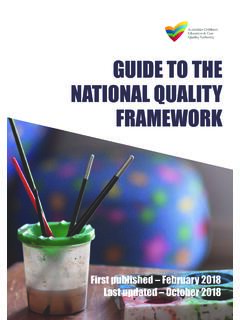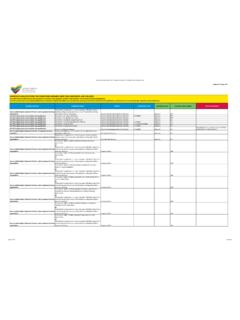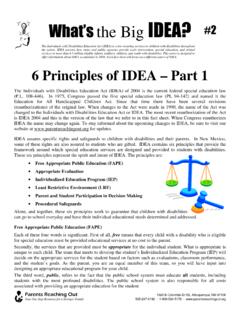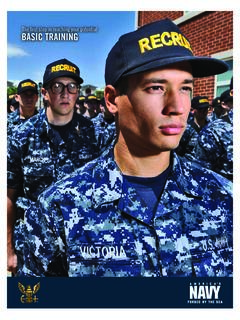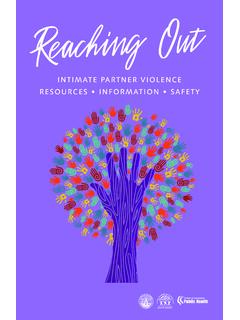Transcription of Engaging with Aboriginal Communities
1 Make contacts with your local Aboriginal communityIf you do not have any contacts or direct links with your local Aboriginal community, a good starting point is to contact either the Local Aboriginal Land Council (LALC) or Local Aboriginal Education Consultative Group (AECG).For further information go to: or out who the Traditional Custodians of your area are and the language spokenMaking contact with the LALC or the AECG should help with finding out the Traditional Custodians of your area. Your local council may also have this access an Aboriginal map go to: out what land or nations your families have connections withChildren are connected to family, a culture, the land, water and the wider community before they are born.
2 So it is important for educators to develop relationships and discuss with the family what land or nation their family has connections with. This will create a greater sense of belonging for children and opportunities for families to identify with the Aboriginal culture in your care environmentTake a walk through your education and care service; reflect on the entrance, indoor and outdoor environments. What do you see? Does your education and care service show you value Aboriginal culture?Investigate what the tribal names are of the local traditional custodians and display Aboriginal language on welcome language, songs, games and stories from the local area in learning do we start?
3 Educators recognise that diversity contributes to the richness of our society and provides a valid evidence base about ways of knowing. For Australia it also includes promoting greater understanding of Aboriginal and Torres Strait Islander ways of knowing and being. (Belonging, Being and Becoming Commonwealth of Australia 2009, ) Engaging withAboriginal CommunitiesForm links with your local Aboriginal communityOne way of establishing and building links with the local community, is to attend community events and meetings. Take the time to explain to the local people, who you are, what you do and how members of the Aboriginal community can be involved in your involved with your local AECG and get to know your Aboriginal educators.
4 If you are fortunate enough to have an Aboriginal educator who is also either a member of, or has links with the local community, don t expect them to do everything Aboriginal and to be the only link with the community. It is important that other educators also build links with the for community elders to visit the education and care service and interact with the opportunities for all educators to establish relationships with community members, and participate in events and community activities so it becomes a shared team the local Aboriginal organisations/elders for a morning tea and respectfully ask if they could tell you some historical information regarding the local an Acknowledgement of Country or Welcome to Country at ceremonies.
5 Official events and in daily proceedings, so the unique position of Aboriginal people in Australia s culture and history is further information: on your enrolment/orientation processHow is the question of a child s cultural heritage asked on your enrolment form? Where the question is left blank, then a casual chat often reveals so much more information than a question on an enrolment out what community dates and community events are celebrated in your local area If you want Aboriginal people to participate in your events, then you also need to take an interest in local Aboriginal events and participate in them whenever your Local Aboriginal Land Council (LALC), Local Aboriginal Education Consultative Group (AECG) or local with Aboriginal Communities Where do we start?
6 Engaging with Aboriginal Communities Where do we start? Useful Links and Resources Aboriginal Education Consultative Group (AECG) - Indigenous Coordination Centre (ICC) - Indigenous Professional Support Unit (IPSU) - Local Aboriginal Land Council (LALC) - National Aboriginal Islander Children s Day (NAICD) - Working with Aboriginal People and Communities - A practical Resource guide (NSW Department of Community Services). Aboriginal perspectivesThe term Aboriginal perspective refers to Aboriginal points of view on particular issues and events.
7 Where possible Aboriginal subject matter and perspectives should be explored in consultation with Aboriginal people in the local community. Inclusion and Professional Support Program (IPSP)The Inclusion and Professional Support Program is an initiative funded by the Australian Government to resource and support *eligible child care services. The IPSP resources and supports the sectors of Education and Care Services. The IPSP is an integrated approach to supporting and enhancing the inclusion and professional development needs of Education and Care Services. Your local Inclusion Support Agency works in partnership with the other IPSP Partners, these include: Indigenous Professional Support Units (IPSU); Professional Support Coordinator (PSC); and the National Inclusion Support Subsidy Provider (NISSP).
8 * Eligible child care services are Australian Government services that receive funding under the Child Care Benefit Scheme or Budget Based Funding under the Child Care Services Support Program.



